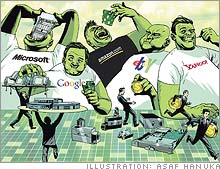|
Silicon Valley's next payday
A spending spree by Microsoft, eBay, Google, Yahoo and others is creating a huge opportunity for established and startup gearmakers alike.
(Business 2.0 Magazine) - Three years ago, Force 10 networks faced a bleak future. Telecoms, the major customers for its high-speed data switches, were collapsing. Then Google ordered a batch of switches for a major expansion of its data centers - and has been buying ever since. "It put the company on the path to the big time," says Gary Morgenthaler, general partner at Morgenthaler Ventures, an investor in Force 10. The startup is reported to have hit $60 million in revenue in 2005 and is expected to file for an IPO soon. Force 10 was at the front edge of a wave of hardware spending that is about to reach tsunami proportions, creating huge opportunities for established and fledgling gearmakers alike. The Big Five Web titans - Amazon.com (Charts), eBay (Charts), Google (Charts), Yahoo (Charts), and especially Microsoft (Charts) - are locked in a frenzied battle to improve their ability to deliver content, whether for Flickr photo albums or eBay's fast-growing listings. To do it they need tons of nuts-and-bolts hardware - storage, servers, routers, switches, load balancers - which they're consuming at an incredible speed.
This year alone the Big Five are expected to spend a total of $5 billion on networking hardware; next year the figure could rise substantially. "These guys represent a new class of carriers," says Scott Kriens, CEO of Juniper Networks. That is, a fourth information-service category after telecoms, cable, and wireless carriers. Call them content-service providers. Content is king
Microsoft, of course, wants to be the biggest content-service provider of all. It recently said it will spend heavily - $2 billion, according to analysts' estimates - in fiscal 2007 to staff up its online-services division and beef up its Internet infrastructure. "This is a sea change in our company," says Blake Irving, vice president for the Windows Live division. "It means hundreds of thousands of servers and petabytes of storage." For example, Microsoft plans to switch all 230 million users of its Hotmail service over to Windows Live Mail accounts with 2 gigabytes of free storage each, matching the amount of free storage Google offers its Gmail customers. That adds up to a whopping 460 petabytes that Microsoft will have to provide, not to mention all the routers and switches needed to shunt the data around. Industry sources say Microsoft is also seeking 10,000 servers for its online gaming service, Xbox Live. Such virtual land grabs mean a major payday for Silicon Valley. Most hardware companies don't want to talk about it, worried that rivals might undercut their bids. But the beneficiaries of the $1.4 billion that Google is projected to splash out on infrastructure in 2006 include disc drive manufacturers Seagate and Hitachi. Network Appliance and Cisco are among Yahoo's major suppliers, while Sun Microsystems boasts about being eBay's server vendor. Juniper has won a Microsoft contract for its routers estimated by some insiders at $120 million. The Big Five's hunger for gear is extreme enough to provide plenty of room at the table for up-and-comers. "The big guys are savvy and are willing to take a chance on a new startup," Morgenthaler says. In addition to Force 10, Google has turned to relative unknown Rackable Systems for servers and signed up tiny Netscaler to increase the speed of online apps. Yahoo has protected its e-mail system with security products from startup Finjan. And eBay says it likes to work with small companies that meet its data center needs. "We look at the mind-set of the startup, how willing and flexible they are," says James Barrese, eBay's VP for systems development.
In the long run, more giant companies are set to open their wallets for Web hardware. Sony will build an online gaming service to support PlayStation 3 and compete with Xbox Live. News Corp. (Charts), which owns MySpace, is another likely buyer. And the more content-service providers there are, the more vital it is that they have the most reliable equipment. As per-click revenue models abound, "every second of downtime is costly," says Juniper's Kriens. |
|

